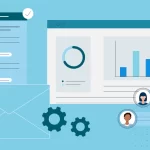You have two main options for developing your data science career: either become a data science professional by working as a data analyst, database developer, or data scientist, or move into an analytics-enabled position as a functional business analyst or a data-driven manager. You must use your data science expertise for each of these options. Data analytics, programming, data management, data mining, and data visualisation are essential skills for both approaches. Both also need a lot of prior experience.
The Professional Paths
Despite the presence of two different professional paths, opportunities for employment are flexible since the business is still relatively new and growing quickly. Depending on the area in which they specialise more deeply, professionals in the field of data science, such as data analysts, may advance into positions such as data scientists or data system developers. By developing their knowledge in fields like artificial intelligence (AI), statistics, data management, and big data analytics, a data analyst may become a data scientist. For that going through the data science syllabus is important.
By gaining more technical knowledge in fields like Python, relational databases, and machine learning, a data analyst may advance into the position of data system developer. Many of these skills may be learned independently by participation in data analytics boot camps or online data science courses, or through practical experience gained in the job. This book’s main discussion subject is the job track for data scientists.
What Distinguishes Data Scientists from Other Data Professionals, Such as Data Analysts?
The abilities and duties needed for entry-level data science work and those of data analysts typically overlap. Both professions need programming knowledge and a working knowledge of statistics. The focus, though, is on something very else.
What duties fall within the purview of data scientists?
Using the data’s context, data scientists respond to questions about the firm. They are more inclined to use modelling, unrestricted research, and data exploitation while creating new product features. They will put a lot of work into cleaning the data so that their models and the machine learning algorithms they have created can utilise it. Behind the scenes, when you watch Netflix and see a personalised list of recommended programmes, machine learning algorithms and data analytics are at work.
Predictive analytics is another another field of research that falls under the umbrella of data science. Because it makes predictions about the future based on data from the past or by combining data from different datasets and sources, predictive data analysis is more difficult than other types of analysis. Predictive data analysis analyses what is likely to happen in the future using historical data or by running a simulation, or it attempts to predict the future by looking at past events. In diagnostic analysis, regression, decision trees, and neural networks are often employed. Choosing data science course in chennai is important there.
Data Science Fundamentals
Big data, also known as gigantic or complex data sets, are any and all data that are difficult or impossible to manage using traditional data processing technology. As a result, data scientists must be familiar with open-source distributed processing platforms.
Address :
360DigiTMG – Data Science Course, Data Scientist Course Training in Chennai
D.No: C1, No.3, 3rd Floor, State Highway 49A, 330, Rajiv Gandhi Salai, NJK Avenue, Thoraipakkam, Tamil Nadu 600097
Contact : 1800-212-654-321






